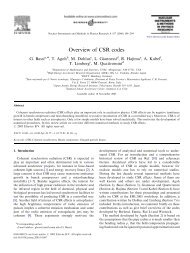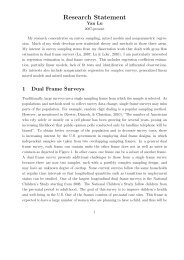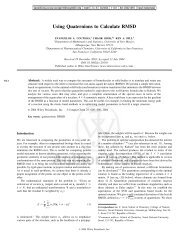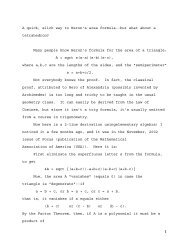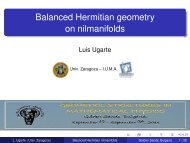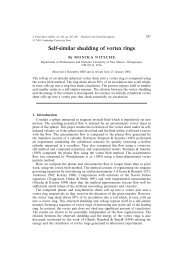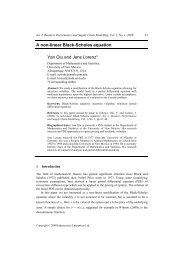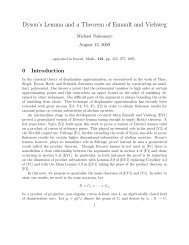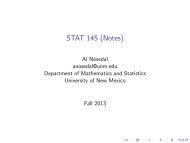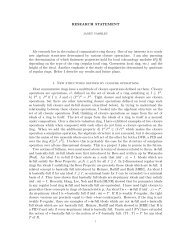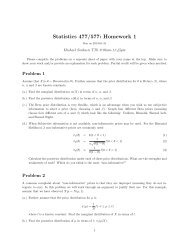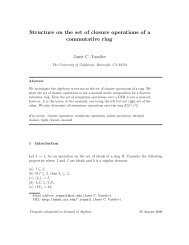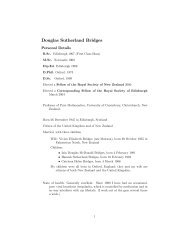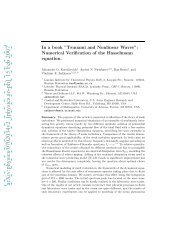OEO Office of Equal Opportunity - Department of Mathematics and ...
OEO Office of Equal Opportunity - Department of Mathematics and ...
OEO Office of Equal Opportunity - Department of Mathematics and ...
Create successful ePaper yourself
Turn your PDF publications into a flip-book with our unique Google optimized e-Paper software.
282 ARTS AND SCIENCES<br />
306./506. Reformation Era, 1500–1600. (3)<br />
(Also <strong>of</strong>fered as HIST 306.) Religious revolution <strong>and</strong> concurrent<br />
development in European politics, society <strong>and</strong> culture.<br />
308. The Jewish Experience in American Literature <strong>and</strong><br />
Culture. (3)<br />
(Also <strong>of</strong>fered as ENGL 308.) A comprehensive survey <strong>of</strong> the<br />
cultural <strong>and</strong> historic relationship between Jews <strong>and</strong> American<br />
culture <strong>and</strong> character as a whole.<br />
323. [323./523.] History <strong>of</strong> the Jewish People to 1492.<br />
(3)<br />
(Also <strong>of</strong>fered as HIST 323.) Survey <strong>of</strong> Jewish history in<br />
Ancient <strong>and</strong> Medieval times, stressing major religious, intellectual,<br />
political <strong>and</strong> social developments. Traces the transformation<br />
<strong>of</strong> the Hebrews into the Jews <strong>and</strong> Israelite religion<br />
into Judaism, Highlights the Rabinic era <strong>and</strong> the diaspora<br />
experience in the Islamic <strong>and</strong> Christian worlds. {Fall}<br />
324./524. Modern History <strong>of</strong> the Jewish People. (3)<br />
(Also <strong>of</strong>fered as HIST 324.) Survey in ethnic history stressing<br />
political, religious <strong>and</strong> social developments from the<br />
expulsion from Spain (1492) to the present. Concentrates on<br />
European Jewry but will include consideration <strong>of</strong> American<br />
Jewish community, modern anti-semitism <strong>and</strong> rise <strong>of</strong> the state<br />
<strong>of</strong> Israel. {Spring 2004 <strong>and</strong> alternate years}<br />
326. [326./526.] History <strong>of</strong> Christianity to 1517. (3)<br />
(Also <strong>of</strong>fered as HIST 326.) The history <strong>of</strong> Christianity from<br />
its beginnings in Palestine to the eve <strong>of</strong> the Protestant<br />
Reformation. Primary focus will be on the rich variety <strong>of</strong><br />
forms—doctrinal, liturgical <strong>and</strong> institutional—that Christianity<br />
assumed through the Medieval centuries. Also <strong>of</strong> concern<br />
will be its contributions <strong>and</strong> significance as a civilizing force.<br />
{Fall}<br />
327. [327./527.] History <strong>of</strong> Christianity, 1517 to Present.<br />
(3)<br />
(Also <strong>of</strong>fered as HIST 327.) The development <strong>of</strong> Christianity<br />
from the Protestant Reformation into the modern world,<br />
including biography, doctrine, liturgy, institutions <strong>and</strong> religious<br />
practice, together with the interaction <strong>of</strong> Christianity with<br />
society at large. {Spring}<br />
331./531. Ch’an <strong>and</strong> Zen Buddhist Philosophy. (3)<br />
(Also <strong>of</strong>fered as PHIL 331.) An examination <strong>of</strong> key writings<br />
by Chinese Ch’an teachers (e.g., Huineng <strong>and</strong> Tung Shan),<br />
medieval Japanese Zen teachers (e.g., Eisai <strong>and</strong> Dogen) <strong>and</strong><br />
modern Japanese thinkers (e.g., Suzuki <strong>and</strong> Nishitani).<br />
Prerequisite: PHIL 101 or 108 or 201 or 202 or 336.<br />
333./533. Ritual Symbols <strong>and</strong> Behavior. (3)<br />
(Also <strong>of</strong>fered as ANTH 333.) Comparative analysis <strong>of</strong> ritual<br />
processes, symbol systems <strong>and</strong> world views in the context<br />
<strong>of</strong> social structure.<br />
347. Topics in Religious Studies. (3, no limit) ∆<br />
Studies in major religious figures or movements. Topic<br />
varies.<br />
350. Religion <strong>and</strong> Literature. (3)<br />
An introduction exploring relationships between the literary<br />
<strong>and</strong> religious traditions. {Fall}<br />
360./560. Christian Classics. (3)<br />
(Also <strong>of</strong>fered as PHIL 360.) A study <strong>of</strong> major writings in<br />
the Christian tradition, written by such persons as Origen,<br />
Augustine, Aquinas, Luther, Calvin <strong>and</strong> Teresa <strong>of</strong> Avila.<br />
Prerequisite: one course in Religious Studies.<br />
361./561. Modern Christian Thought. (3)<br />
(Also <strong>of</strong>fered as PHIL 361.) Background <strong>of</strong> the intellectual<br />
issues facing Roman Catholic <strong>and</strong> Protestant traditions<br />
today.<br />
Prerequisite: one course in Religious Studies.<br />
365./565. Philosophy <strong>of</strong> Religion. (3)<br />
(Also <strong>of</strong>fered as PHIL 365.) Philosophic analysis <strong>of</strong> some<br />
major concepts <strong>and</strong> problems in religion.<br />
Prerequisite: one course in Religious Studies.<br />
*387. Latin American Liberation Theology. (3)<br />
Religious currents in Latin American thought, concentrating<br />
on the contemporary period, with special attention to the<br />
movement called liberation theology.<br />
Prerequisite: one course in Religious Studies.<br />
388. Topics in Brazilian Thought. (3)<br />
(Also <strong>of</strong>fered as PHIL 388.) A philosophical analysis <strong>of</strong><br />
selected topics from Brazilian intellectual history <strong>and</strong> contemporary<br />
Brazilian thought in the areas <strong>of</strong> art, economics,<br />
literature, philosophy, politics, religion, theatre <strong>and</strong> society.<br />
Prerequisite: one course in Religious Studies.<br />
389. Latin American Thought I. (3)<br />
(Also <strong>of</strong>fered as HIST, PHIL, SOC 389.) Pre-Columbian<br />
thought through independence ideologies.<br />
Prerequisite: one course in Religious Studies.<br />
390. Latin American Thought II. (3)<br />
(Also <strong>of</strong>fered as HIST, PHIL, SOC 390.) Positivism through<br />
contemporary thought.<br />
Prerequisite: one course in Religious Studies.<br />
392. Black Liberation <strong>and</strong> Religion. (3) Okunor<br />
(Also <strong>of</strong>fered as AFAM 392.) Introduction to some traditional<br />
western religious schools <strong>of</strong> thought as a basis for intensive<br />
examination <strong>of</strong> the works <strong>of</strong> prominent Black liberation<br />
theologians.<br />
404./504. Augustine. (3)<br />
(Also <strong>of</strong>fered as PHIL 404.)<br />
Prerequisite: one course in Philosophy or Religious Studies.<br />
*407. Sanskrit I. (3)<br />
(Also <strong>of</strong>fered as LING, MLNG 407.) An introduction to the<br />
Sanskrit language in conjunction with readings from classical<br />
Sanskrit literature in translation.<br />
*408. Sanskrit II. (3)<br />
(Also <strong>of</strong>fered as LING, MLNG 408.) The continuation <strong>of</strong><br />
Sanskrit I: the completion <strong>of</strong> the study <strong>of</strong> Sanskrit grammar<br />
<strong>and</strong> an introduction to the reading <strong>of</strong> Sanskrit texts.<br />
413./513. Kierkegaard. (3)<br />
(Also <strong>of</strong>fered as PHIL 413.)<br />
*422. Sociology <strong>of</strong> Religion. (3)<br />
(Also <strong>of</strong>fered as SOC 422.) Study <strong>of</strong> belief, commitment, <strong>and</strong><br />
practice within religious <strong>and</strong> spiritual traditons <strong>and</strong> institutions,<br />
with a focus on contemporary United States, Latin<br />
America, <strong>and</strong> the Middle East.<br />
Prerequisite: 263 or 264, SOC 101. {Spring}<br />
426./626. History <strong>of</strong> the Holocaust. (3) Pugach<br />
(Also <strong>of</strong>fered as HIST 426.) An examination <strong>of</strong> the motives,<br />
methods <strong>and</strong> execution <strong>of</strong> the destruction <strong>of</strong> the Jews by Nazi<br />
Germany <strong>and</strong> the responses <strong>of</strong> Jews, Western Powers, the<br />
Churches <strong>and</strong> Righteous Gentiles in the context <strong>of</strong> Jewish<br />
<strong>and</strong> world history.<br />
*430. American Religious Communication. (3)<br />
(Also <strong>of</strong>fered as CJ 430.) This course examines the roles <strong>of</strong><br />
religious communication during the Puritan period, the first<br />
<strong>and</strong> second awakenings <strong>and</strong> the period <strong>of</strong> media evangelism.<br />
The course examines various types <strong>of</strong> communicators, messages,<br />
audiences <strong>and</strong> channels <strong>of</strong> persuasion.<br />
438./538. Buddhist Philosophy—India. (3)<br />
(Also <strong>of</strong>fered as PHIL 438.) A survey <strong>of</strong> Hinayana <strong>and</strong><br />
Mahayana philosophical thought as it developed in South<br />
Asia, together with its religious, historical <strong>and</strong> social context.<br />
439. [439/539.] Buddhist Philosophy—China. (3)<br />
(Also <strong>of</strong>fered as PHIL 439.) Development <strong>of</strong> Buddhist thought<br />
in China <strong>and</strong> East Asia from T’ang dynasty to the present.<br />
440./540. Buddhist Sutras Seminar. (3) ∆<br />
(Also <strong>of</strong>fered as PHIL 440.) Two-week intensive summer<br />
course at Jemez Bodhi M<strong>and</strong>a Zen Center. Study <strong>of</strong> both<br />
theory <strong>and</strong> practice with visiting pr<strong>of</strong>essors from various<br />
universities. <strong>Opportunity</strong> for directed meditation for interested<br />
UNM CATALOG 2006–2007 Symbols, page 611.



